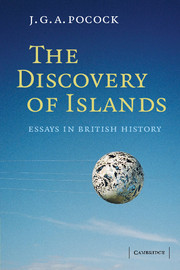Book contents
- Frontmatter
- Contents
- Preface and acknowledgements
- Note on bibliographies
- PART I THE FIELD PROPOSED
- PART II THE THREE KINGDOMS AND THE ENGLISH PROBLEM
- PART III EMPIRE AND REBELLION IN THE FIRST AGE OF UNION
- PART IV NEW ZEALAND IN THE STRANGE MULTIPLICITY
- 11 The neo-Britains and the three empires (2003)
- 12 Tangata whenua and Enlightenment anthropology (1992)
- 13 Law, sovereignty and history in a divided culture: the case of New Zealand and the Treaty of Waitangi (1992/1998)
- PART V BRITAIN, EUROPE AND POST-MODERN HISTORY
- Bibliographies
- Index
11 - The neo-Britains and the three empires (2003)
Published online by Cambridge University Press: 05 June 2012
- Frontmatter
- Contents
- Preface and acknowledgements
- Note on bibliographies
- PART I THE FIELD PROPOSED
- PART II THE THREE KINGDOMS AND THE ENGLISH PROBLEM
- PART III EMPIRE AND REBELLION IN THE FIRST AGE OF UNION
- PART IV NEW ZEALAND IN THE STRANGE MULTIPLICITY
- 11 The neo-Britains and the three empires (2003)
- 12 Tangata whenua and Enlightenment anthropology (1992)
- 13 Law, sovereignty and history in a divided culture: the case of New Zealand and the Treaty of Waitangi (1992/1998)
- PART V BRITAIN, EUROPE AND POST-MODERN HISTORY
- Bibliographies
- Index
Summary
The Second Age of Union (1801–1921) was the peak period of British empire. This last phrase, however, is in need of deconstruction. Certainly, it has for many reasons been conventional to date from c. 1783 the advent of a ‘Second British Empire’, exercised initially over Hindu and Muslim Indians where the ‘First’ had been exercised over colonists in America. India, however, was not a colony; its peoples lived under other forms of subjection, and the British residents in India were not colonists in the sense of settlers. In consequence, these two ‘empires’ differed in kind and did not form a sequence. It was predominantly after the loss of the American colonies that British statesmen began debating the altogether new problem of governing larger populations outside the archipelagic-Atlantic region, European in neither their geography nor their culture; a problem never debated before – though there are moments in the literature of empire in Ireland which in some ways anticipate it – raising the philosophical problem of whether the relations of property to liberty in western Europe were or were not unique and non-repeatable. Ireland, however, is part of the history of empire in an older sense. The debate over India, and the massive acquisitions of power in that region which produced it, stand at mid-point in the history of empire in a new sense: that is, of a process by which some European states and their economies acquired seaborne power over a preponderance of the peoples of the planet.
- Type
- Chapter
- Information
- The Discovery of Islands , pp. 181 - 198Publisher: Cambridge University PressPrint publication year: 2005



